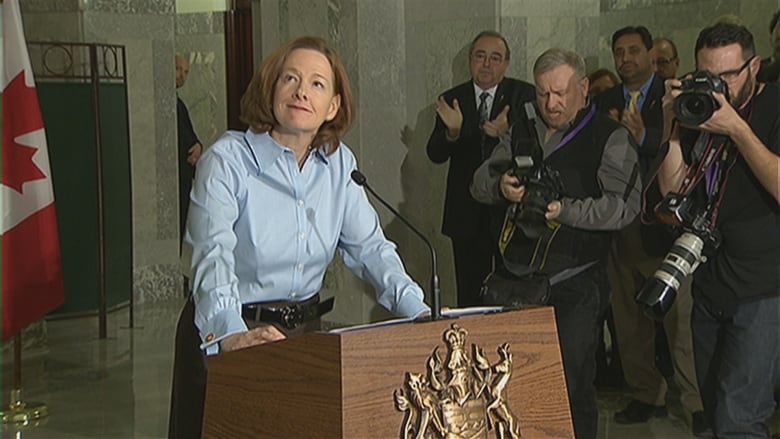Think you know who'll replace Jason Kenney? Think again
In past leadership contests, being the perceived front-runner was a bit of a curse

This column is an opinion from Graham Thomson, an award-winning journalist who has covered Alberta politics for more than 30 years. For more information about CBC's Opinion section, please see the FAQ.
Now that the race is officially underway for leader of Alberta's United Conservative Party, you'll be hearing this question a lot: Who will win?
Or at the very least: Who is the front-runner?
The two questions might sound like the same thing, but they are vastly different.
Let's take a look back at the leadership races for the old Progressive Conservative party — one of the forerunners of today's UCP.
In the three most hotly-contested PC leadership contests from 1992 to 2011 (when the party was still in power), the front-runner lost every time.
That was a result of front-runner overconfidence, a preferential balloting system, and backstabbing politics.
In fact, being the perceived front-runner was a bit of a curse.
Speaking of which, who is the front-runner this time around?
You could argue Brian Jean, the former Wildrose leader and MLA who helped undermine Jason Kenney, is the front-runner based on public opinion. A Leger poll released on June 1 indicated that 22 per cent of 1,000 Albertans surveyed thought Jean "would make the best leader" of the UCP.
In second place was former-Wildrose-leader-who-notoriously-crossed-the-floor-to-the-PCs-in-2014 Danielle Smith with 18 per cent. Former finance minister Travis Toews was the bronze medallist with just five per cent.
For anyone relying on public opinion to handicap this race, here is the rub.
The Leger poll surveyed the general public. The new UCP leader will be chosen not by the general public but by United Conservative members — and because memberships will be sold over the next eight weeks by frantic leadership teams, you couldn't even generate an accurate poll of party members today.

The Leger poll might help some candidates establish their credibility with party members, but the survey is really just an indication of name recognition among the general public and that's a fickle measurement when dealing with an in-house party vote, especially when that vote won't happen until Oct. 6.
How about caucus support?
In that case, Toews is the clear front-runner with the endorsement of 23 party MLAs compared with three for former children's services minister Rebecca Schulz, two for Jean and one for former transportation minister Rajan Sawhney.
However, having the most caucus endorsements did not help front-runners in previous Conservative leadership races.
In 2006, Jim Dinning was endorsed by 38 MLAs but lost to underdog Ed Stelmach, who had 12 MLAs in his camp.
In 2011, Gary Mar had the support of 34 MLAs but lost to Alison Redford, who had just one MLA on her team (other than herself).

Those front-runners fell victim to a preferential balloting system that allowed for a good-old-fashioned political kneecapping.
In both those races, because nobody managed to win a simple majority on the first ballot, the system kicked out every candidate except for the top three finishers who progressed to a second ballot, where party members ranked their first and second choices.
That's where the vagaries of human nature kicked in, as the underdogs made deals to throw support to each other to bring down the front runner.
Thus, the 2006 leadership race came down to "anyone but Dinning" and in 2011 it was "anyone but Mar."
Even though the Conservatives' 1992 race had a different dynamic, the winner of the first ballot, Nancy Betkowski, lost to Ralph Klein on the second.
The preferential balloting system that requires a winner to get at least 50 per cent of the vote or face repeated rounds of voting creates conditions for a wild-card outcome.
Ranked ballot
If it sounds overly complicated, just keep in mind this crucial fact: the UCP will also be using a preferential balloting system. It is not identical to the old Progressive Conservatives' system but it's close enough to make the outcome something of a coin toss.
UCP members will rank their choices in order of preference on one ballot. If there are nine candidates, for example, members will rank the candidates from one to nine.
Party workers will count all the votes on Oct. 6. If nobody wins a clear majority on the first vote, the last-place candidate will be dropped from the race and the next choice of that failed candidate's ballots will be added to the totals of the next round.
If nobody wins a majority on the second count, the process will be repeated until one candidate gets more than 50 per cent support.
Of course, if a candidate manages to win a majority on the first count, then they are declared the winner immediately and the preferential ballot is a moot point. But with seven or eight or even nine people in the race, it will be virtually impossible for one person to get at least 50 per cent of the vote on the first try.
There is so much at stake in the outcome of the UCP leadership race that it is sure to degenerate into a brawl. After all, the winner won't just become party leader but premier of Alberta ahead of a general election scheduled for May 29, 2023.
It won't be decided just on popularity, caucus support or membership sales, but on political manoeuvring. That's why some of the lower-key campaigns, such as Rajan Sawhney's, will be happy to have her avoid the cursed front-runner status in favour of becoming the compromise candidate who slips up the middle to victory.